new posts in all blogs
Viewing: Blog Posts Tagged with: Surveys and polls, Most Recent at Top [Help]
Results 1 - 17 of 17
How to use this Page
You are viewing the most recent posts tagged with the words: Surveys and polls in the JacketFlap blog reader. What is a tag? Think of a tag as a keyword or category label. Tags can both help you find posts on JacketFlap.com as well as provide an easy way for you to "remember" and classify posts for later recall. Try adding a tag yourself by clicking "Add a tag" below a post's header. Scroll down through the list of Recent Posts in the left column and click on a post title that sounds interesting. You can view all posts from a specific blog by clicking the Blog name in the right column, or you can click a 'More Posts from this Blog' link in any individual post.
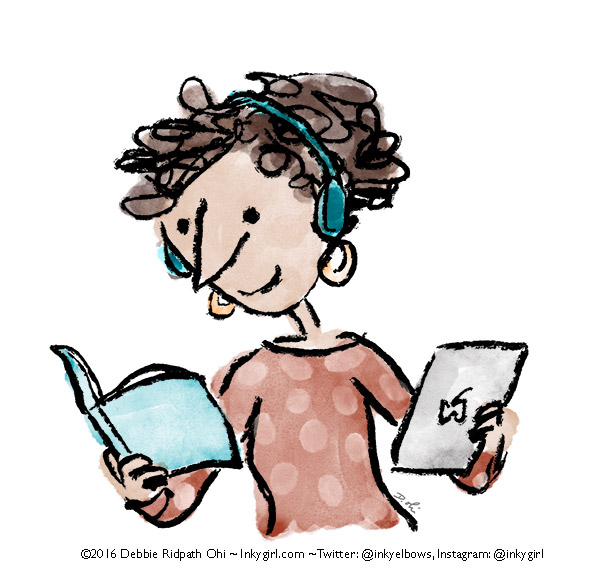
I read books in all formats: print, digital and audio. If the story is good, I'll read in any format. I got curious about whether other people felt the same way, so I recently posted a one-question poll asking:
"In the past year, how have you read books? Check all that apply."
424 people responded. I opted for a multiple choice rather than "which do you prefer" for this poll to cut out the need to decide on a preference, plus it gets complicated because I would need to include different categories of reading; someone may prefer picture books in print, for example, but opt for a digital version of a novel for older readers.
So I let you check as many formats as you'd like. Here's what you said:
98% of you said you read at least one print book in the past year.
61% of you said you read digital books on your tablet or Kindle. Some of you added a comment that you read ebooks on your phone.
43% of you said you listened to audiobooks.
19% of you said that you read digital books on your computer.
I also had a comment field for those who had more to say.
HERE'S WHAT SOME OF YOU SAID ABOUT WHY YOU PREFER PRINT BOOKS:
Almost everyone said they had read at least one print book in the past year (as opposed to digital). Some of you gave reasons why you enjoy or prefer print books, and these included:
- Enjoying the physical sensation of holding a print book, turning pages, etc.
- Print books can be more easily shared.
- Print books can be put in the classroom and library for silent reading.
- Special edition, collector's edition, autographed.
- Technical books where tables and charts don't easily transfer to an e-reader.
- Easier to read longform text in print than on a screen. (Interestingly, some of you said it was easier to read longform text in digital format; see below.) One of you said you printed out PDFs of public domain books.
WHY SOME OF YOU SAID YOU READ OR PREFER DIGITAL BOOKS:
While many of you said you preferred reading print books (reasons included enjoying the feel of the book in your hands, turning pages, special edition, autographing, easier to read than on a screen etc.), quite a few of you said you also read digital books. Reasons given include:
- Easier to travel with digital books.
- Instant gratification when it comes to buying.
- Easier to read (don't have to turn on reading light, can enlarge the print).
- Takes up less space at home.
- Cheaper.
A few comments:
"I adore physical books, they'll always be my preference. I think the cover design and feel of a book can't be beaten. But sometimes the convenience of e-books wins ie my recent holiday, in which I knew I'd read a lot, and actual books would have filled my already bulging case." - @BookMonsterAlly
"I only buy print picture books and we listen to a ton of audio. If I am reading a new release that's adult or ya, I will sometimes go with the ebook because it is quicker and cheaper. I will buy it in print if it is particularly special to me. :)" - @mvp1972
"Books are memories bound in paper to me. Not just stories. I can't bring myself to read them digitally. I need to keep them on my shelf so I remember." - @bethnavarro76
"I have read in all kinds of formats and on different devices, but I still prefer print. The others are all about opportunity...it's easier to read on my ereader when I can't sleep at night - plus it's nice to pack because I can take so many books with me. I love my phone because I can easily and quickly access library titles and listen to audiobooks on it (making road trips - especially solo road trips - more appealing)." - @cbethm
"I prefer reading "real books", but the Kindle allows me to read at night without worrying about the size of the book and without having to turn on the lights (I have a paper white Kindle)" - @santiagocasares
"I like the smell and feel of paper books. Audio books are ok, but with 2 little ones I have less time for them than paper books. Also I read much faster than an audiobook could, so I prefer paper. Not a fan of eBooks but love that more people read using these. I think they are best for nonfiction. Especially nonfiction that has information that changes from year to year." - @daniduck
"I own a Kobo and occasionally read short ebooks on the computer, but for business, never for pleasure. The reading experience isn't very satisfactory. Jean-Luc Picard always kept a book in his ready room. If it's good enough for him, it's good enough for me. :P" - @heathermoconnor
"I will always treasure real paper and ink books more than those of the digital kind. A real book is like comfort food. It reminds you of childhood and it is so much like a present that gets opened every time you go back to it. Perhaps this has to do with belonging to an older generation. I am not sure. Younger people who are digital natives might have a different opinion. This is a great question." - Anonymous
---
Thanks again to all those who responded! Feel free to browse more results from past Inkygirlsurveys and polls.
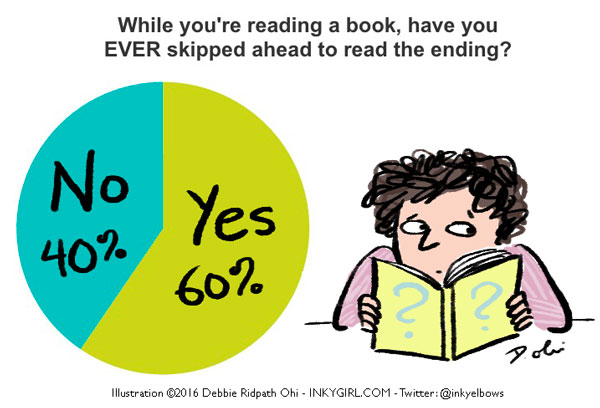
Thanks to all who responded to my most recent poll, which asked "While you're reading a book, have you EVER skipped ahead to read the ending?"
Out of 126 respondents, 60% (or rather 59.52, rounded up) of you replied YES, with the remaining 40% saying NO.
Why did you skip ahead?
67% of you said it was because you were enjoying the book but found it so tense that you felt compelled to read the ending before going back and reading the rest. 47% said it was because they weren't sure if they liked how the book was going, so wanted to find out if it was worth reading to the end. The remaining 35% of you said it was because you weren't really enjoying the book but had to read it (for whatever reason), so needed to know how it ended.
Most of the comments elaborated on the reasons above. A surprising number of you said that you read the ending first on a regular basis, that you don't mind spoilers, that knowing where a book is heading actually enhances your reading enjoyment. Sometimes you want to know if a favorite character in a book or series is going to be killed off.
Some of you said it was because you were reading late at night and had to go to sleep but still wanted to finish the book.
Some of you were horrified at the idea of skipping ahead to read the ending, couldn't imagine how ANYONE would ever want to do this.
Two of my favorite comments about why some of you skip ahead to the ending:
"Because I needed to prepare myself if Harry, Ron, or Hermione died!"
"I am, at my basest levels, an impatient cheat."
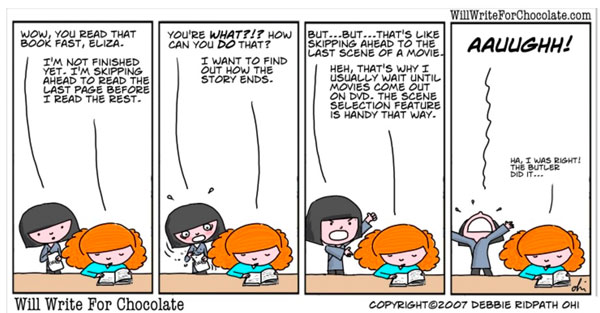
Curious about my other publishing industry surveys? Feel free to browse current and past Inkygirl Surveys online.
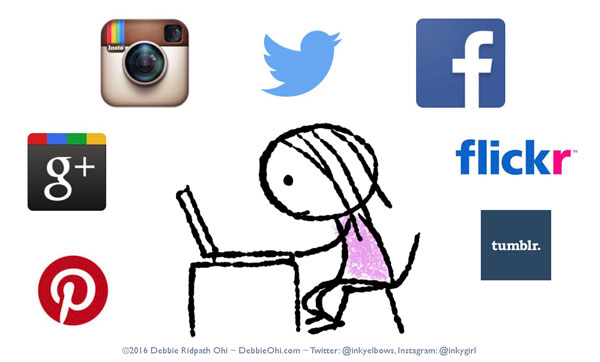
To agents, editors and art directors out there: please take a few minutes to answer a short anonymous poll to help up-and-coming writers and illustrators?
Results will be discussed at the SCBWI-Florida Regional Conference, SCBWI Metro NY Chapter (Feb event) and SCBWI-LA Writer's Day as well as summarized in Inkygirl.com later this year.
For editors and art directors, I'm looking for those who are involved in the decision-making process re: book contracts or initial talent-scouting. Thank you SO MUCH!
You can find results to previous surveys in my Inkygirl Survey Archives.
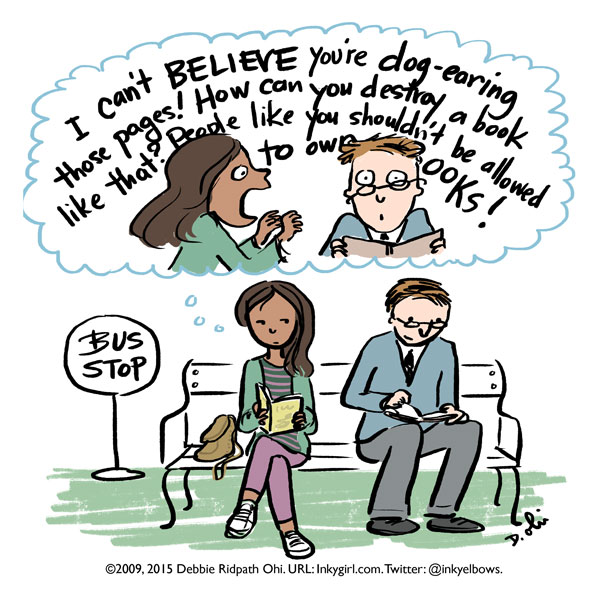
After posting the found object doodle below on FB, a flurry of comments (turns out I'm not the only one who has a strong emotional reaction to dog-eared pages in books :-)) prompted me to post this anonymous 1-question survey:
How do you feel about dog-earing pages? After you answer my anonymous 1-question poll, you'll see what others have said.
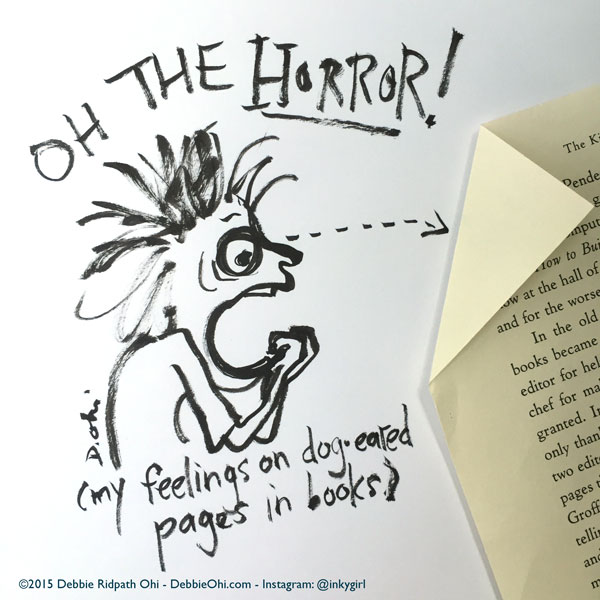
------
Curious about my other publishing industry surveys? Feel free to browse current and past Inkygirl Surveys online.

In my recent survey, I asked those of you working with agents to answer a few questions about how you got your agent. First off, thank you SO MUCH to those who took the time to respond in order to help others in the community. These include: Hayley Chewins, Julie Glover, Kellie DuBay Gillis, Michael Wayne, Anne Marie Pace, Kristin Gray, Denise Gallagher, Corey Schwartz, Beth Ferry, Julie Dao, Stephanie Diaz, Russ Cox, Sarah Albee, Stephanie Fletcher-Stephens, Ashlyn Anstee, Melissa Caruso, Julie Falatko, Bruce Hale, Mike Jung, Heidi Schulz, Amy Lozier, Josh Funk, Jim Averbeck, Edward Willett, Kelley McMorris, Annie Cardi, Carter Higgins, Susan VanHecke, Jennifer Gray Olson, Andria W. Rosenbaum and Juana Martinez-Neal. Others responded anonymously.
74 people responded and almost all were children's/YA book writers or illustrators. Most got their agent through an email query.
While researching agents and given the choices in my survey, respondents said the most useful resources of the ones I listed were Twitter, Publisher's Marketplace, AgentQuery.com, SCBWI conferences and Literary Rambles, followed by Writer's Digest resources like the annual Children's Writer's & Illustrator's Guide and Chuck Sambuchino's Guide To Literary Agents. This survey was mainly conducted through Twitter, so it's not surprising that Twitter came out on top.
Do scroll down to read some of the info-packed comments about other useful resources like QueryTracker, agency blogs and websites, AbsoluteWrite forums, SCBWI BlueBoard forums. Comments also include info about people got their agents, such as getting noticed during the 12x12 Picture Book Challenge, Preditors & Editors, #PitMad on Twitter (Pitch Madness - learn the rules before participating!) and #MSWL on Twitter (Manuscript Wish List - learn the rules before participating!).
Here's a further summary and breakdown of the results as of today (August 14, 2015).
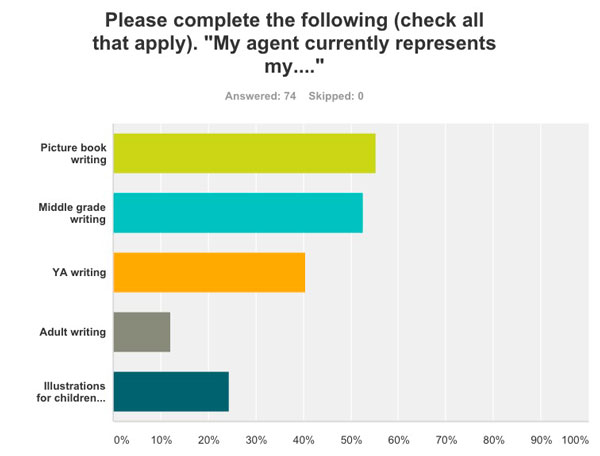
As you can tell from the above, most of the respondents' represented work focuses on children's/YA writing. About 25% had agents representing their children's book illustration work.
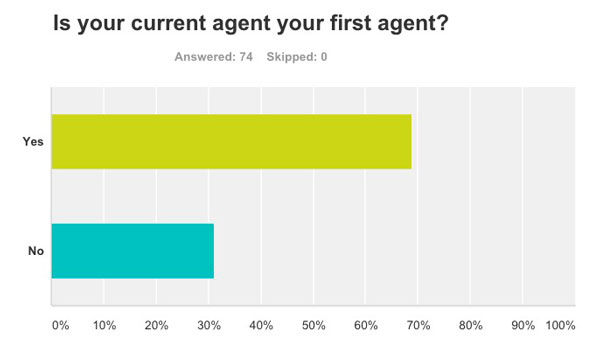
Approx. 70% of respondents said they were working with their first agent. The others had worked with other agents before.
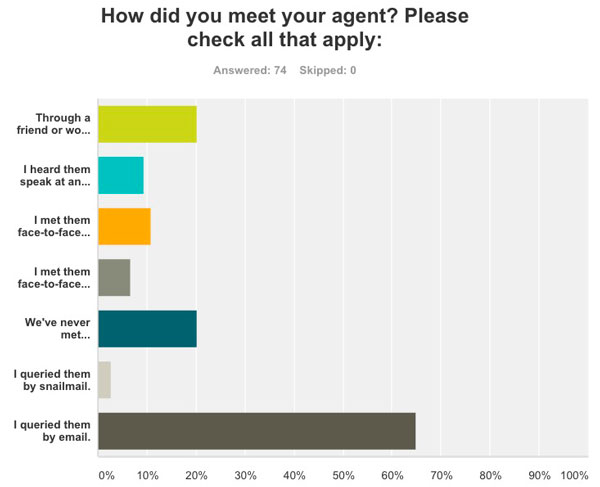
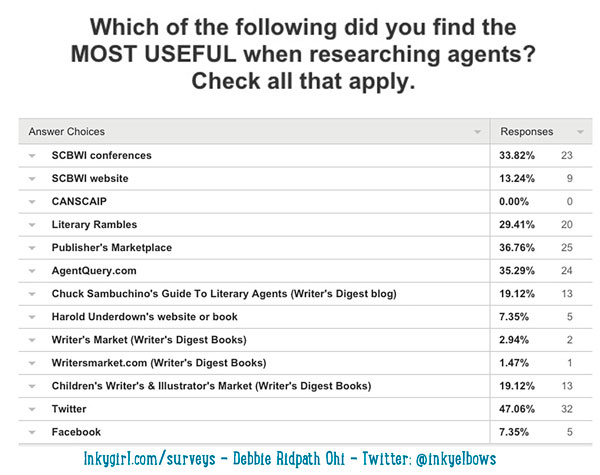
Here are some of additional comments about useful resources while researching agents:
"Online searches about what agents said and represented, conversations with authors already in the publishing business." - Julie Glover
"The SCBWI blueboard! Also, agent's blogs and agency websites." - Kellie DuBay Gillis
"Author friends - individual agent google searches which often bring up a variety of insightful blog interviews - agency websites." - Michael Wayne
"Probably most helpful was just googling agents to find interviews and other information, especially agency websites. Facebook was helpful mostly because of a private Facebook group of PitchWars '14 mentees that I belong to--networking with other writers is a big help. I also used QueryTracker. The AbsoluteWrite forums are usesful too."
"When I signed with my agent in early 2007, Facebook was just catching on and I don't think anyone had Twitter yet--okay, I checked Wikipedia--it was very small at that time! The Children's Writers and Illustrators Market was only in hardcover, not online! Much has changed, very quickly!" - Anne Marie Pace
"Recommendations from other agented writers, and recommendations from my former agent."
"12 x 12 picture book challenge submission."
"Also Querytracker." - Kristin Gray
"Pitch Madness on Twitter!" - Denise Gallagher
"I also learned about a lot of agents and agencies through other writers and through contests. (This is mostly where Twitter comes in... as a vehicle for word of mouth.) I used Publisher's Marketplace and AgentQuery more as a secondary reference to look up more info on agents, rather than a place to find them in the first place." - Melissa Caruso
"Querytracker.com, pred-ed.com." - Russ Cox
"General online research, agent interviews, etc."
"One of her clients gave me a referral." - Corey Schwartz
"Google. And, of course, the official agency websites are huge sources of information."
"Blog post loutreleaven showing a list of literary agents."
Additional comments about how they met their agent:
"We had never met face to face, but she contracted me after seeing my work in the Portfolio Showcase. Then we met (face to face) a few weeks later. A month or so after that, I signed with her agency. We have seen each other a few times since I signed, but mainly we communicate via email (and occasionally phone)."
"We met through the #PitMad Twitter pitch contest where she requested my work!" - Julie Dao
"I heard her speak at an SCBWI Editor's Day. The following year, I had her critique one of my manuscripts for SCBWI Agent's Day, and was signed soon after." - Stephanie Fletcher-Stephens
"Online via Verla Kay's Blueboards and my blog. Joan contacted me to request pages." - Mike Jung
"It was a case of right match, right time. I liked what he said in his talk, took advantage of his offer to submit stories, and found that he really liked one of my pieces -- enough to represent me." - @storyguy1
"I was referred by another agent."
"I queried her by email before an SCBWI event that I was volunteering at and she was speaking at." - Jennifer Gray Olson
"Personal reference from one of her existing clients." - Josh Funk
"Answered request from Manuscript Wish List (#MSWL)."
"They noticed me because I won the SCBWI Student Illustrator Scholarship." - Kelley McMorris
"Through my MFA program (VCFA)- she was a fellow student at the time." - Amy
"I met my agent through a #PitMad twitter pitch event."
"I had planned to query her based on research I'd done, but she invited me to submit my query letter, synopsis, and first 3 chapters from a Twitter pitch."
---------------------------------
Again, THANK YOU SO MUCH for those who took the time to respond!
If you have comments or suggestions, including your own experience with researching and finding an agent, I encourage you to post below.
If you haven't already, feel free to also check out my list of agents on Twitter who represent kidlit/YA as well as my FAQ post about finding an agent (and how I found mine).
Curious about my other publishing industry surveys? Feel free to browse current and past Inkygirl Surveys online.

I've been getting more people asking me for advice about how to get an agent, so in addition to updating my FAQ post about "Any advice on how to get an agent? How did YOU get your agent?", I've also posted a new survey.
If you're a children's/YA author or illustrator currently working with an agent, I'd very much appreciate it if you could take a few minutes to answer this quickie (multiple choice) anonymous poll about how you got your agent.
Results will be included in a future Inkygirl post.
In Inkygirl recently, I talked about how I'm sometimes more productive when I have sounds from a coffee shop playing in the background. Do you usually like to have background noise while you're working? If so, what type?
One-third of you prefer silence but the rest like some kind of background noise. Of the latter, 70% prefer ambient noise and 45% prefer music without lyrics.
These days, my favourite ambient noise tool is Coffivity. I've also recently signed up for Spotify, and use playlists like Indie Folk For Focus, Superior Study Playlist, Music For Concentration and Brain Food.
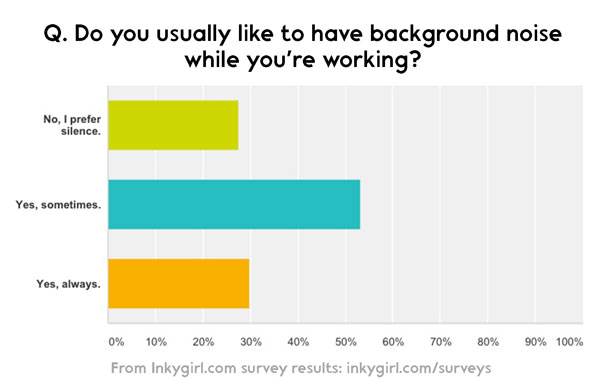
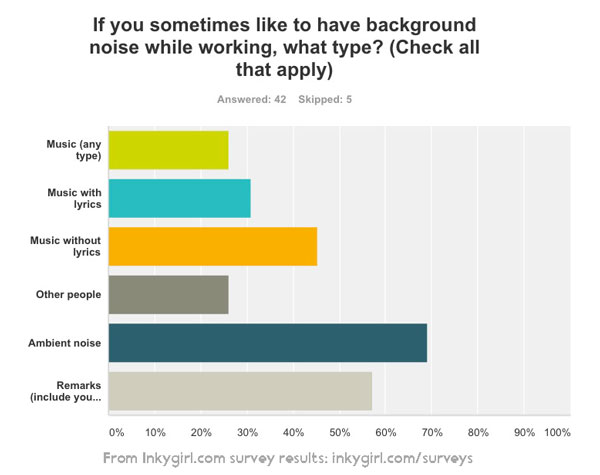
Next poll question: Are you giving any physical books this holiday season? (yes/no)
------
Curious about my other publishing industry surveys? Feel free to browse current and past Inkygirl Surveys online.
In prep for my workshop at CANSCAIP's Packaging Your Imagination, I asked literary agents, editors and art directors a few questions about whether they research potential clients, authors and illustrators online and what they look for. 18 editors (some of whom also look for picture book illustrators), 8 agents and 2 art directors responded.
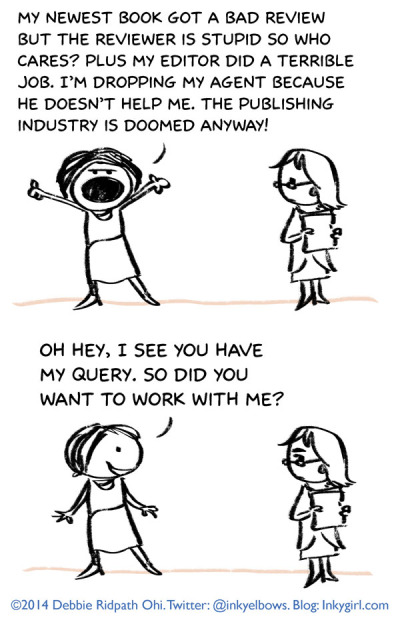
Here's what they said:
QUESTION: When you are considering taking on a new client/author/illustrator, do you ever research them online?
77% of respondents said that when they are considering taking on a new client, author and illustrator, they ALWAYS research them online. The rest said they sometimes do.
QUESTION: If you do online research before signing on a client/author/illustrator, has your research ever made you decide NOT to sign them on?
62% said that YES, they have decided to reject someone after researching them online. Some said that while they hadn't yet rejected someone after online research, they would definitely think twice about signing with someone who posts a lot of negativity (see below) or posts "with cringe-inducing syntax."
OTHER COMMENTS:
In this section, I invited respondents to volunteer additional comments, including turn-ons and turn-offs, what they look for during online research.
The following respondents gave me permission to use their names.
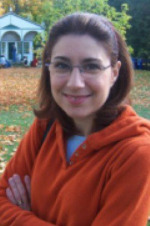 Christie Harkin, Consultant Publisher at Clockwise Press:
Christie Harkin, Consultant Publisher at Clockwise Press:
"I have been turned off by authors/illustrators who bad-mouth their editors/publishers/agents. It is amazing to me when I see this on Facebook. Even if you don't mention your editor/publisher by name, it is usually very obvious to whom you are referring. I would definitely think twice about taking on someone who did this. Also, I look for authors/illustrators who are generous in sharing news about others in the community. People who only post promo about their own books (BUY MY BOOK! LOOK AT MY STUFF!) are not generally as well-received or connected with the larger community. If you are a new or emerging creator, you need to be engaging with others who are also plugged in to the kidlit world."
 Andrew Karre, Editorial Director at Carolrhoda Books:
Andrew Karre, Editorial Director at Carolrhoda Books:
"An extent online presence is not a necessity. It's gravy. But . . . I place a certain amount of value on a social media presence that seems human and natural and interesting. A Twitter stream that is full of interesting engaged conversations on a variety of topics--even topics other than books--is somewhat more interesting to me than one that is all review links and retweets. I don't much care how many followers. (Unless, of course, it's a huge number, because I am not an idiot about what that means.)"
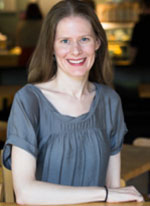 Carol Hinz, Editorial Director at Millbrook Press:
Carol Hinz, Editorial Director at Millbrook Press:
"I'm not necessarily looking for something in particular when I look up an author or illustrator. I simply want to find out if the person has a web presence and, if so, what it is. It's also helpful to get a sense of what else they've done, how they present themselves, whether they do school visits, and what helpful connections they may have (whether it's with other writers, educators, booksellers, etc.) when it comes to book promotion."
Other Comments:
NOTE: Most of the respondents answered anonymously but to avoid the awkward he/she decision, I decided to use "he" or "she" randomly.
One agent said she decided not to request material from previously published authors who got combative with reviewers. Another respondent said that while he hadn't yet rejected a project based on online research, he may make a note to discuss proper online etiquette with that particular author or illustrator. "But I believe the day is coming where my online research will make me answer 'no' when I question, 'Do I love this book enough to want to deal with THIS'?"
Another respondent said that online research sometimes makes her ask more questions, change the direction or focus of the conversation, dig deeper ("and not always in a negative way"), sometimes for the benefit of both of them and sometimes in ways that lead to more meaningful partnerships.
"Biggest turn-off: Writers who get argumentative and/or rude with reviewers and bloggers online. I also look at blog and social media posts that see how the writer comes across in their daily interactions. I'm wary when a writer acts rude, cynical, prejudiced, or pessimistic on social media. That's not to say that people can't have down moments, but if their overall feeds are full complaints and abuse toward others, it's an immediate "no." I've been lucky, though, to have found clients who are all positive, dedicated writers open to criticism and growing in their craft."
"I'm usually just looking for more information and/or to confirm my initial impression. I do notice if someone writes extensively about the writing and publication process ("got another rejection today!") or if he/she does a lot of self-publishing. Neither of these are deal-breakers at all, but they present unique challenges. I actually do most of my sleuthing with agents and agencies, and in that case I do judge if I see a lot of awful self-published covers (but again, may still work with them). Also, I assume writers and agents research me online but the less I'm reminded of that, the better—like don't start every email to me by mentioning something I've posted on Facebook. I don't like the feeling of someone friending me on social media in order to 'gain access.'"
"I look for obviously divisive posts, things that I see that I think would turn off a readership. Professionalism online is important, and also gives me an idea of what you'd be like to work with. I also look to see how you interact with others on your blog/twitter/site whether or not you acknowledge people who leave comments or tweet with you."
"Turn offs= being unprofessional/rude/inappropriate in a public online setting. Why would I want someone with that type of behavior linked to me as an agent and the agency as a whole?"
"When researching someone online, I'm generally just looking to flesh out my knowledge of that person in advance of a possible acquisition. I'm not actually looking for trouble spots, just maybe things to discuss at an IRL meeting with colleagues (sales points) or with the author themselves (small talk). When it's an illustrator, particularly; I do a lot of triage online before anyone's necessarily aware that I'm looking - I use online portfolios to identify leads. I'd advise artists to have as much art available to view online as possible. Use places like deviantart if you don't have a well-maintained personal site or an illustration agent with a good easily searchable site. Probably use deviantart even if you do. The easier your work is to find, the more work you'll pick up. I've been involved in acquisitions where a Google search turned up a certain amount of Internet Drama. It never really influenced the decision - we signed people up each time. I could imagine scenarios in which it would be a deal-breaker - for example, if we discovered that an author was a Neo-Nazi, that wouldn't play well - but none of them has so far come to pass. Incidentally, I think the situation in which duly diligent research is crucial is if you are an author or illustrator being offered work by a publisher or agent. You need to check out the bona fides of the person or company asking to contract with you, because there are an awful lot of sharks out there." - @iucounu on Twitter
"Turn ons - lots of work with the same energy and talent that brought the illustrator to my attention in the first place. Turn offs - samples that look dated, have styles that are very different and less appealing to me than the first sample I saw, very few samples."
"Online turn-offs: people who tweet way too often, people who only speak and don't engage others in conversation, people who are far too self-promotey, people who share way too much of their personal lives, people who are far too neurotic (tweeting constantly about writing woes and insecurities), people who are far, far, far too negative about anything and everything, and the biggest of all: people who feel the need to insult other writers/houses/editors/agents. Oh, and also, writers who quote themselves online. Online turn-ons: people who engage in meaningful discussion (without hitting me on the head with a hammer), people who find that balance between an online persona and being who they really are, people more interested in building a community than shilling their work, people who are endlessly supportive of fellow writers (without being obnoxious about it). What I really want to learn when I research a writer online is what they're after. Did they write the book to jump on the gravy train, hoping it would be the quick path to fame and fortune? Did they write the book because they scoff at the genre they just wrote and wanted to prove anyone could do it? Or is this someone who is serious about building a writing career and not just receiving the adulation of thousands of strangers? THAT'S the writer I want to work with. Someone dedicated to their craft and not their number of Facebook friends or Twitter followers."
(On whether they have rejected someone after online research) "Not if I really, really love the book, but if an author has exhibited abrasive or unpleasant behavior online, it definitely makes me think twice about signing them. When I sign someone, I'm not just signing up the project--I'm going to have to work with the author for a long time, and I prefer not to invite a headache into my life. While a great web presence is a definite plus, I'd never turn someone down for a lackluster web presence. But if I discover combative, difficult behavior, etc, I have to decide if this person is worth the unpleasantness they'll likely bring to my life. Because people are usually consistent--ie, if they're unpleasant to some people, they'll probably be unpleasant to me too if and when any difficulties in our working relationship arise."
-----
Curious about my other publishing industry surveys? Feel free to browse current and past Inkygirl Surveys online.
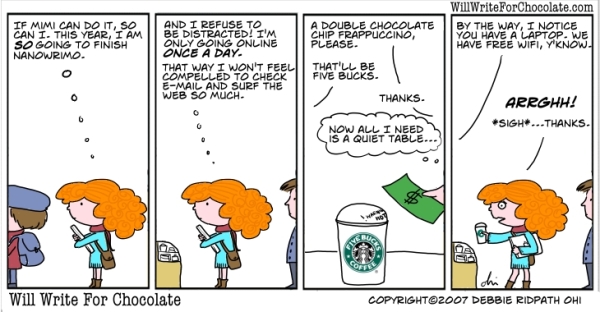
Survey: Do you like background noise while you're working?
Don't know about the rest of you, but I find my background noise preference depends heavily on what I'm working on. When I'm illustrating and am past the early sketch stages, I listen to audiobooks or have episodes of a previously-watched tv shows playing on my second monitor; the key for me is to have something interesting enough for variety but not TOO interesting to distract me from work.
For early creative stages and for writing, I used to prefer silence. These days, however, I like to have something going on in the background, especially if my work day has been especially long. Music with English lyrics is too distracting, so I listen to Italian progrock but even that can start driving me crazy after a while.
One of my favorite background sounds for intense creative work? Coffee shop noise: murmured conversations, movement, muted clatter of cups and cutlery. I also find having people around who are DOING things stimulating, and I'm less likely to start daydreaming or slack off. I used to go to real-life coffee shops to do my writing, but this has downsides. The expense, for one thing, plus sometimes the conversations taking place around me are a tad TOO interesting.
Looks as if I'm not the only one who finds coffee shops and coffee shop sounds motivating:
How The Hum Of A Coffee Shop Can Boost Creativity - by Anahad O'Connor in The New York Times
Why Some Of Us Get More Done At Coffee Shops - by Kevin Purdy on Lifehacker
Coffitivity Plays Ambient Coffee Shop Noise To Boost Your Productivity - by Melanie Pinola on Lifehacker
For others who like coffee shop sounds in the background while they work, here's one solution:
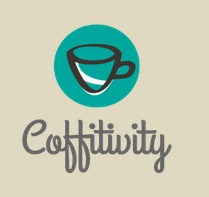 Coffitivity: Just opening up the website page will start up the sounds of a coffee shop, and you can also get free apps for iOS, Droid and Mac desktop. I prefer the latter because I don't like having my browser open while working because it's too tempting to "just check one more website."
Coffitivity: Just opening up the website page will start up the sounds of a coffee shop, and you can also get free apps for iOS, Droid and Mac desktop. I prefer the latter because I don't like having my browser open while working because it's too tempting to "just check one more website."
There are choices of other sounds as well, like a campus cafe and lunchtime lounge. Coffitivity has also invited the community to submit sounds to share, so I expect we'll get more choices soon.
How about the rest of you? Do you prefer silence? If not, what do you like to listen to while you work? I'd appreciate you taking a few minutes to answer my 1-2 multiple question poll: Do you prefer background noise while you work?
I'll post results in an upcoming Inkygirl post.
I recently did a quickie poll on Twitter asking the following:
Q. Have you seen a young person reading a book on a digital device in the past year? (where a "young person" is teenager or younger)?
Approximately half of the respondents said yes:
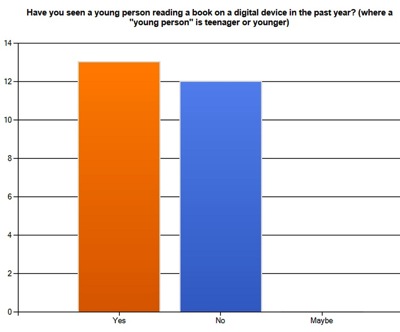
Some of the comments:
"Have seen students read on phones, iPads and ereaders." - @stein_valerie
"As a teacher, I regularly us ebooks to engage reluctant readers - YA and Middle Grade. Adding a layer of technology like a tablet or ereader can give kids who don't see themselves as readers a reason to at least try to read. From there, it's up to the story to engage them and keep them reading until the end."
"My 7 year old asked for an e-reader for Christmas. An e-reader mind you, not an app or internet enabled tablet. She loves the 'magic' of getting new books instantly without leaving home. No down time between Little House in the Big Woods and Little House on the Prairie, priceless."
"Yes, on books, tablets, computers and phones- not really kindled though that might be my area." - @mz_christie
"My 5 year old likes reading ebooks with dad when he is away on business, over Skype. They each have a copy of the book on an iPad and can turn pages together. But the kids don't read on their own on ebook devices (too expensive to allow unfettered access!)"
"Yes, if my own kids count and they are using my device (with books I downloaded for them.) They never ask if they can read on my Nook. I've never seen a child in the wild reading on a digital device. Playing games...yes. Reading, no."
"Hard to tell on the subway WHAT a child is doing on an iPad, but it seems to always be games. I still see kids with pbooks, though!"
"Handy for teens reading public domain works for school." - @bhalpin
Please note that results would probably differ for a general public survey. My Twitter followers are almost all readers themselves, including teachers and librarians.
-------
You can also see other current and past surveys in the Inkygirl Survey Archives.
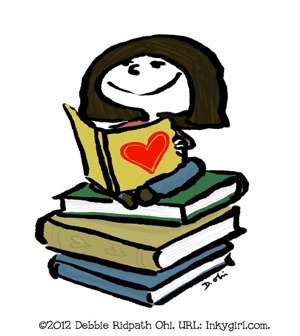
A while ago, I asked how you all discover books to read. 239 responded.
Here's what you said:
Q: How do you discover new books to read?
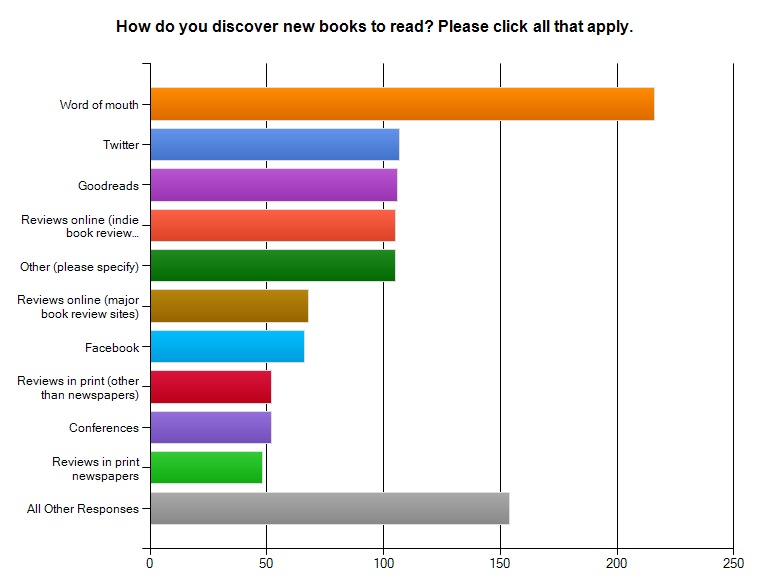
Keep in mind that most of the respondents are kidlit/YA and/or publishing industry people. 71% describe themselves as writers, 16% book bloggers, 13% teachers, 9% librarians, 8% illustrators, 7% editors, 2% publishers, 1% agents.
Word of mouth was the the most popular way that people said they discovered new books to read.
Many said that they discover books by browsing library and bookstore shelves as well as recommendations from librarians and booksellers. Quite a few mentioned Amazon recommendations and NPR. Others mentioned talk shows like Oprah, television interviews, NPR reviews & discussions, publisher catalogs, Audible.com author blogs, individual author blogs, when book awards are announced, library discards, book clubs, radio reviews, favorite blogs that also recommend books, literature courses, book calendars, books encountered while doing research, panels and discussions at conventions, book swaps, publisher & bookseller previews.
The goal of these surveys is to help writers in their craft and business, and results are always posted here on Inkygirl.
For past survey results, see the Inkygirl Survey Archives.

For a list of all survey results as well as current surveys still in progress, see my Inkygirl Survey Archives.
Thanks to all those who responded to my most recent survey, which asked:
Q. When making a book purchase, do you prefer ebook or print format?
Of 129 responses, 60% said they preferred print. 25% preferred ebook/digital.
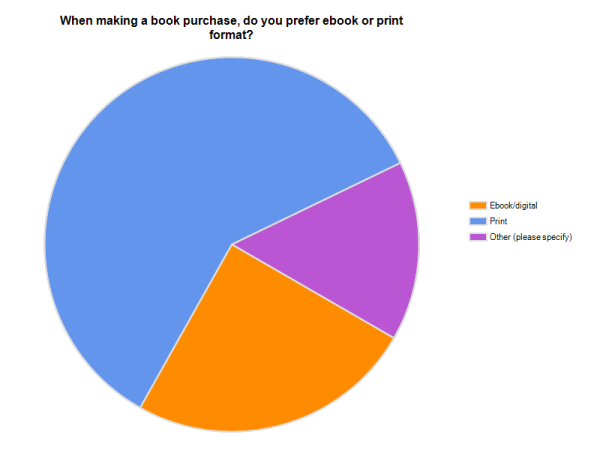
Of the remaining responses ("Other"), here are some of the comments:
Ebook to get it fast for YA, but print book for picture books, & when I really love a book I want both. - @CherylRainfield
I do both. It varies with price and format. Some picture books don't look so great on the Kindle. They look better on the iPad. - @StacySJensen
Print if I plan to share with my students. (so MG books) E if I'd like to be able to read it anywhere (love having selection on my device) E if it is MY copy of a book I'm using with a reading group (love the notes features on my device and I don't lose my notes that way) Print if I already own part of the series or it's a series I think I will loan to family or friends (it's complicated!) - @Mselke01
I prefer print for fiction or anything pictorial, but I like ebooks for quick access to information
It depends. For a quick read, ebook. For things I want to save and reread or refer to often, print. - @bexdk
It depends on the book. For most, I prefer ebook. But there are some I want a print copy for my bookshelves. Usually, they are by favorite authors or friends.
I like print for children's books, ebook for adult (pleasure) print for how to book's...
Depends on the book and the price..and where I'll be reading. For travel, I prefer e-books. For home or camping, I prefer print. - Julie Chilton
Ebook for fiction, print for non-fiction. - @crazywritinfool
Both. I can't really separate the two because I usually end up buying the book in print even if I have it on my Kindle/iPad. I can't give up my books. I also will buy books for Kindle that I already own in print simply because it is easier to take on a trip or read in bed (for example: "War & Peace"). - @InkyTwig
Both! I love having both formats for different situations. - @wickedagrarian
Depends on the book. If it's something I want straight away, ebook, if it's more of a collectable - print.
E-book for texts I'll read linearly (novels, short stories). Print for reference materials, anything with graphics, anything I expect to consult arbitrary sections of. Also print for books with more "staying power", ones I'll want to have for years and years, 'cause who knows what'll happen to digital content over time?
Depends on the format & purpose: print = illustrated books e = reference books a = audiobooks, which is the only format I consume for fun. - @chaletfan
Ebooks, unless there are many illustrations or photos. In that case, I prefer print.
It depends. If I need something right now, I'll order a Kindle version, but for a nice slow read, I'll order print. If I want something to take on the plane, I order a Kindle; if I want to read it while taking a bath, I'll order print. For study and writing in the margins I'll order print because I don't care for the annotation function in electronic devices. Even the markup function in Word is annoying even though it's industry standard. - @suelange
I only buy drm-free ebooks and so my selection is limited, but I'm quickly coming to prefer digital over print. - @limako
Depends on the book. Picture Book, Easy Reader - Print (love to look at the color illustrations and for studying page turns) MG, YA Fiction - Ebook (convenience of being able to take it anywhere easily) - @darshanakhiani
Digital for novels, print for picture books.
Whichever is cheapest, naturally! (which at the moment is nearly ALWAYS print) - @readitdaddy
------------
Next survey: Book Trailers - Do They Work? (3 multiple choice questions + optional comments)
Do you have a suggestion for a future survey question? Please let me know!

I currently have over 21,000 followers in Twitter, and I've noticed that whenever I ask a question of interest to writers, I get quite a few great answers. Unless everyone uses the same hashtag, however, only I see replies. To help others benefit and exchange helpful info, I've decided to start up a series of informal surveys to do with writing, reading and publishing.
I'm using an upgraded Surveymonkey service, did a test run a while back, and am pleased with the interface/security. My test question: Do you own an ebook reader? 73% said yes.
Feel free to suggest survey questions, but please note that I am only interested in questions whose answers will ultimately help writers in their craft or business or knowledge of the industry, NOT for a specific project or promo.
Here's the first official survey: When making a book purchase, do you prefer digital or print? Please answer here. Anyone who answers will see the aggregate results. I'll post a more detailed summary in an upcoming Inkygirl post.
And if you have suggestions for future survey questions, please do post them below or use this form. Thanks!
My "writer uniform" today:
-- Red track pants
-- T-shirt
-- Fleece jacket
I try to avoid working in pajamas. I know some writers do, but I don't because I inevitably lose track of time when I'm working, and I don't want to have to answer the front door.
What do YOU tend to wear when you write?
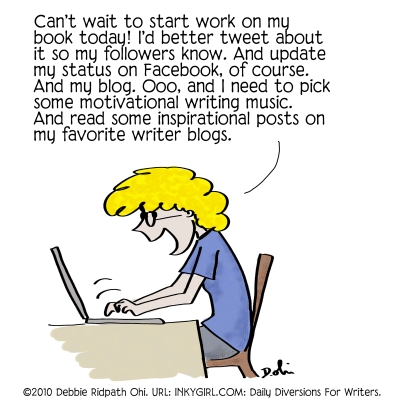
Apologies for the sporadic schedule of my blog posts lately. I'm finding it much easier to post regularly in my inkyelbows Twitter account, if you're interested in writing tweets...I usually post there at least several times a day.
Since the SCBWI Summer Conference, I've been approached by a number of publishers interested in my illustrations and/or writing. While it's wonderful to have the attention after years of trying to get publishers to notice me, I'm now scrambling to get my projects finished so I have something to send.
Which brings me to time management. There's a fine balance between working on building up a strong author platform and not spending enough time creating the content for that platform to support. But where do you draw the line? I'm still figuring that out myself.
Meanwhile, however, I'm about to send off one mss today (yay!) and aiming to finish a nonfiction book proposal to send out by the end of next week.
What about the rest of you? How do you balance social networking and blogging with your writing time?
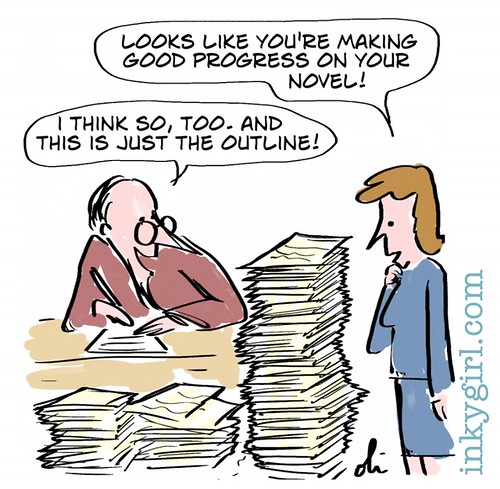
A while back I posted a poll about whether you outlined before you started to write. 109 people responded, and 48% of you said you do use an outline. 29% said no, and 32% of you said it’s too complicated for just a yes/no answer.
Those who outline say it helps keep them on track as well as saving time later — if they encounter a major plot problem, for example, it better to have to restructure an outline than have to restructure a written novel.
Those who shun outlines say it’s because they don’t want their creativity or interest to be sapped away by writing a detailed outline.
Many seem to prefer a very rough outline to give them a vague guideline about where they want their plot and characters to go, but leaving enough leeway to change their minds along the way.
Thanks to everyone who responded!
Here are some of your responses:
Lazette Gifford: “I am a true believer in outlines. For a good many years I didn’t work with them and swore I never would, but I found that once I learned the process and level of outline that works for me, I could write far more complex and coherent manuscripts. The trick, I think, is to be willing to experiment with different things. Any writer who decides there is only ‘one true way’ to write (or to outline) isn’t open to experimentation, which I feel is a vital part of growth as a writer. I do sometimes still write ‘without a net’ for the fun of it, but the books inevitably need far more reworking than those where I have already worked out subplots and have a direction in which to go. Outlines are roadmaps of your story’s journey. They point you in the right direction and give you points of interest to cover. They don’t tell you exactly what your character is going to say and do and they don’t disallow surprises, detours and side trips along the way. But even if you go off the map, so to speak, they’re there to help you find your way back to a satisfying end.”
J.A. Marlow: “Way back when I used to be a pantser. But the stories weren’t very good, and the projects wouldn’t get finished. In 2007 I tried Nano for the first time, and read Lazette Giffords free Nano book with the Phase Outline. From that moment everything changed. I use different types of outlines depending on what the books need. Sometimes it’s a quick phase outline of the important milestones. Sometimes it’s by scene. Sometimes I take it by scene and then outline underneath each scene (I’ve written an article in Vision about using Scrivener to do this). I’ve had a 100 word outline, and outlines of 20k. The one thing I try to do, is to be flexible on the needs of each particular project. The big plus about finding outlining methods that work is that I’ve finished every writing project I’ve started. Talk about exciting!”
Claudia Osmond: “I’ve found that when I outline it bogs me down and I think more about where I’m “supposed” to be going rather than where the story wants to take me. For me, writing is like life: no matter how much I try to plan it out, it always ends up growing legs of its own and rarely does it take the path I’d thought it should. So I’ve learned to live my

I’ve posted a new survey via Survey Monkey. Please do answer via this link rather than in the comments section for your results to be included in the summary.
I’ll post a follow-up on survey results next week. Thanks!
































I think it’s important to find that personal level of outlining. Some people need a lot, and some people need very little. Myself, I’m somewhere in the middle. Too much outlining takes the fun out of the story… why would I want to write it twice? But too little outlining and I find the book ends up needing too much editing. There’s a careful balance and each time I outline I come closer to achieving it.
My main problem is that I get so caught up in the outline that I end up losing track of the story. I am trying to find a happy meduim in it all
When I write, I know the beginning, the ending (or I at least have a vague idea of the ending) and usually a few scenes that I know are going to pop up somewhere in between…that’s all the outlining I can handle, and if I write it down then I forget it. It’s like my mind realizes it doesn’t have to bother remembering anymore, so it forgets, and then if I don’t think about all my cool ideas, I lose all motivation to write.
So I personally don’t like to outline…I’ve tried it before and it hasn’t worked. If that works for other people, though, then great. ^_^
For an outline, I used to write something vague, reasoning if it did not help, it did not hurt and I could change it whenever I wanted to. I did glance at it once in a while, but did not consider it a great help. But last year I had to make a clear outline for a children’s book to help raise funds (it is going to be distributed free to local school children in September), as well as a chapter scheme. It was a bit of a chore, but when the project was covered and I could start writing I found that the writing process went so much smoother because I knew exactly when and where stuff was happening and I could really enjoy myself with just getting the words right. So in the future, I will continue make specific outlines. I found it very rewarding.
Great post! It’s interesting to see how different people work. I find that outlining helps motivate me to keep going, because if I get stuck, I know what should come next. Of course, that doesn’t stop me from changing it if I think of a better way to go.
Love this – the one that aligns most closely with my current work-in-progress would be Sandra Gullard’s “I think of the outline as an imaginative first draft. I’m pleased with the method.”
I’d get lost when it comes to the re-writing without a detailed map of some kind.
Also, different books need different types of outlines. There isn’t a single way (even for me) that will fit all material. Sometimes I write incredibly detailed outlines and sometimes only a line or two per chapter.
It’s also important to remember that you are not writing the outlines for your English teacher. No one is going to grade you on them. They don’t have to follow a set format.
It’s even entirely permissable (and often needed) to hit a section where you don’t know exactly what will happen so you note ’something important happens here and everyone leaves the building.’ You did that because you need the people to leave. You don’t know exactly how you are going to do it yet. By the time you get to that point in the story you know the characters, location and aspects of the plot that allow you to build a perfectly reasonable and wonderfully inspired way to do it.
Stories grow far beyond anything you can outline. I know that for some people outlines just don’t work. However, I think all authors should be open to experimenting before they make up their minds on any aspect of writing You never know when something is just going to click.
(I am also amused to see J.A. Marlow right below me. — Waves — We talk most nights in the Forward Motion Chat room and she is now, with this upcoming issue, an assistant at Vision.)
I don’t outline, but I do use what I call a complications worksheet (http://childrenspublishing.blogspot.com/2010/03/plotting-made-easy-complications.html) which lets me plot out the action, plot and character turning points, and causal relationships within a four (or three) act structure by answering questions that increase the conflict of the story by throwing more and more at the protag. I’m just finishing up the one for my current WIP. I can’t see myself ever writing a novel-length work again without thinking things through in some semi-formal way. I have tried in the past, and my last YA came together only after I did the complications worksheet between drafts.
:Waves at Zette and challenges her to one page of Revision!:
I enjoyed seeing the comments on this. It’s wonderful at how many different ways there are to approach writing. It allows different personality types access to this crazy addiction.
I agree with several of the other commenters. It’s important to remain flexible, keeping your mind open, and willing to learn new things. Not just for each writer, but also for each book or project. There is no such thing as “That absolutely will not work” unless it doesn’t result in a finished book. It’s up to each writer to find out what works for them and for each of their various projects.
Thanks for doing this poll. It was great to see the comments from the poll itself as well as the comments to this blog post. Also great to see how many writers took the time to participate.
By the way, if anyone wants to write an article for Visionabout their processes for writing (including their preferred way of outlining), please contact me!